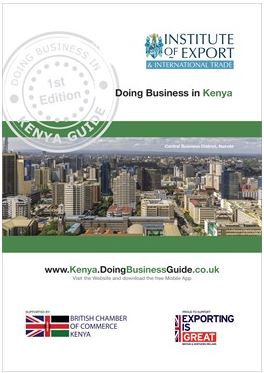
Whilst this market can be challenging, historic ties to Britain mean that English is the language of business and there is a demand for British products. British companies are well placed to take advantage of opportunities in a number of sectors especially those to do with ICT, education & skills, transport, financial services and energy. For businesses looking to expand their presence in East Africa as a whole, Kenya provides a logical first step.
The Port of Mombasa is already the most important deep-water port in the region, catering to the shipping needs of more than a dozen countries and Kenya's financial and manufacturing industries, while relatively modest, are also the most sophisticated in East Africa.
As far as business culture is concerned, most business meetings are conducted in English and while corporate dress code is generally formal, nobody is likely to fault you for omitting a tie in your attire. It is common to find Kenyans going out of their way to make sure you feel comfortable often asking to know if you need any extra arrangements made for the meeting such as enlisting the services of an interpreter. It is important to remember that when responding to questions, you should try to avoid flat out ‘no’ responses, as most communities consider these rude. Similarly, you should also avoid phrasing any queries in the negative as these can lead to misunderstandings.
Although the Kenyan market can be challenging, not least because of the bureaucracy you will probably encounter, ease of doing business in Kenya has improved greatly in recent years, largely spurred on by key government reforms.
You may also find having a local presence or establishing a good relationship with a local agent can help avoid many unnecessary restrictions. Whatever approach your business chooses to take, our new Doing Business in Kenya guide can help guide you through the intricacies of doing business in this fascinating country.
Six things to know about doing business in Kenya
- Kenya is now the 6th largest economy in Sub-Saharan Africa and home to 44 million people.
- There are positive prospects of economic growth predicted despite the challenging global environment from 5.9% in 2016, 6% has been forecast for 2017 with the prospect of 6.1% by 2018, according to the World Bank.
- Kenya officially became a lower-middle-income country in 2014 following a GDP recalculation exercise.
- The World Bank’s 2017 ease of doing business report ranks Kenya 92nd out of 190 economies, while the World Economic Forum’s Global Competitiveness Index 2016-2017 places Kenya at 96th out of 138.
- Kenya has the largest gross domestic product (GDP) economy in Southeast and Central Africa. Sectors attracting investment include oil and gas exploration, energy, banking, real estate, retailing, consumer goods manufacturing, vehicle assembly, agriculture and tourism.
- The country has a market-based economy with a liberalised foreign trade policy.
The guide is available to download from here or you can download an app (from both the Apple App Store and Google Play Store). Alternatively, you can order a free full colour hard copy brochure here.




